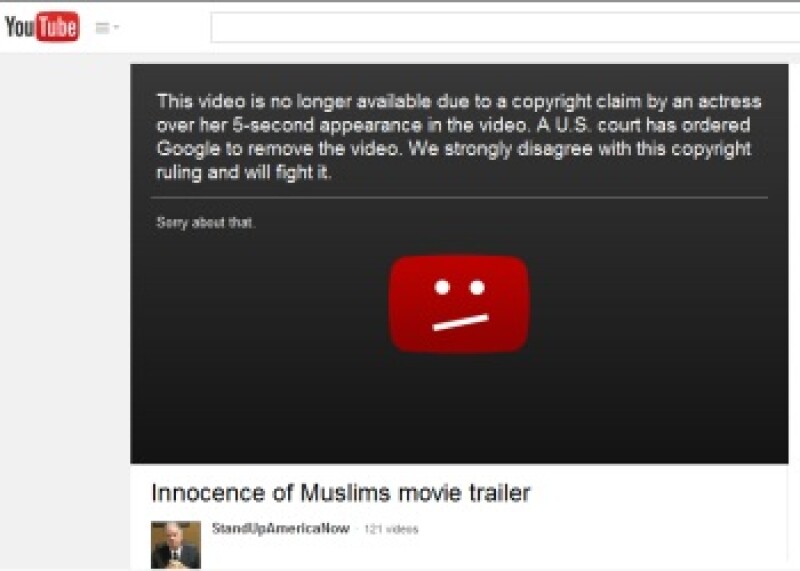
The biggest news to break this week was the controversial Ninth Circuit decision in Garcia v Google, which has sent the copyright community into shock and dismay.
You can read our round-up of the decision here and view our Spotify story collecting some of the best reactions from social media here.
It was also a high-profile week at the Supreme Court, with two related patent cases being argued.
You can read our preview of the arguments for Octane v Icon and Highmark v Allcare here, as well as our debriefing of the comments and questions from the Supreme Court judges here (subscribers and triallists only for both of those links).
Below are a selection of other stories that caught the eye this week.
us20congress.jpg Anti-troll bills pile up
A new bill aimed at curbing patent trolls sending misleading demand letters was introduced in the Senate this week. This brings the number of bills introduced in the House and Senate aimed at trolls to 12.
The latest bill, The Transparency in Assertion of Patents Act, was introduced by Senators Claire McCaskill and Jay Rockefeller, both Democrats. The EFF summed up the bill’s provisions by saying it would:
• Require that demand letters contain certain basic information, such as a description of the patent at issue, a description of the product or service that allegedly infringes it, the names and contact information for the patent's owners, and disclosures of ongoing re-examinations or litigations involving that patent.
• Define certain egregious behaviours as an illegal unfair or deceptive practice, such as sending letters threatening litigation without a real intent to file litigation or sending letters that lack a reasonable basis in the law.
• Explicitly give state attorneys general the power to target similar bad behaviour in their own states.
• Allow the Federal Trade Commission to enforce these rules by levying penalties of $16,000 per each violation.
The onus is on the Senate to pass a bill following the House in December passing the Innovation Act. This week 42 state attorneys general also sent a letter to the Senate committee leadership urging it to pass a bill and suggesting four amendments to legislation. In addition, Oregon on Wednesday became the second state to pass anti-troll legislation after Vermont last year.
betty20boop.jpg You can bet on Betty
Betty Boop was back in court this week. Following her starring role in the US Court of Appeals for the Ninth Circuit three years ago, when the court got into a muddle over aesthetic functionality, the cartoon character has now popped up in the High Court in London, writes James Nurton.
The trade mark dispute between Hearst and AVELA concerned Betty Boop merchandise, and involved various national and Community trade marks for the name of the 1930s character and her image. Following a lengthy discussion of the history of the dispute and the legal issues, Mr Justice Birss concluded that there was trade mark infringement and passing off.
Betty has at least one more starring role to come, though. A separate claim in this dispute, involving copyright infringement, is due to be heard in January 2015.
Candy trademark application crushed
The maker of the Candy Crush Saga app withdrew its application for a US trade mark on the word “candy” on Monday. King.com announced it would withdraw the application following a spate of negative publicity from the video game industry, with many developers criticising the mark for being too generic, writes Alli Pyrah.

Over the years, the word has featured in video game titles such as BulletCandy, Candyz and Tiny Toon Adventures: Dizzy's Candy Quest.
King’s efforts to secure exclusive use of the word candy prompted a bitter open letter from a developer called Albert Ransom, maker of the CandySwipe game. Ransom accused King of asking the USPTO to cancel his 2010 trade mark, which he claimed was registered two years before Candy Crush Saga existed.
The move also inspired some game developers to launch a competition called Candy Jam. The requirements were to produce a game with “candy” in the title.
In a statement to kotaku.com, King said: “King has withdrawn its trademark application for Candy in the US, which we applied for in February 2013 before we acquired the early rights to Candy Crusher.
“Each market that King operates in is different with regard to IP. We feel that having the rights to Candy Crusher is the best option for protecting Candy Crush in the US market. This does not affect our EU trademark for Candy and we continue to take all appropriate steps to protect our IP.”
IPCom’s $2 billion rejection
A German court today rejected IPCom’s €1.57 billion ($2.15 billion) claim for patent infringement against Apple. A Mannheim court also rejected a similar lawsuit that IPCom filed against HTC. The patents in both cases described technology for granting mobile phones access to cellular networks.
According to the FOSS Patents blog, the court concluded that Apple and HTC did not infringe a certain IPCom patent family by implementing the 3G/UMTS standard. IPCom bought the patents in 2007 from Robert Bosch, a German car parts maker.
Simpsons actor’s baseball character ruled safe
The Simpsons voice actor Hank Azaria has won a copyright dispute with fellow actor Craig Bierko over a baseball announcer character.
Azaria – who voices characters in The Simpsons including Moe, Apu, Chief Wiggum and Comic Book Guy – debuted his baseball character in a Funny or Die Video called Jim Brockmire, a Legend in the Booth in 2010. He filed a suit in 2012 after Bierko claimed to have first voiced the baseball announcer character, and was threatening legal action.

The two had exchanged impressions of a baseball announcer character for years, with Azaria calling Bierko in 1997 to discuss possibly using the voice for a project. In that instance Bierko requested that Azaria not use the voice.
US District Judge Gary Feess ruled that Azaria’s character qualifies as fixed in a tangible medium and original. The judge said Azaria had expressed particular details such as Brockmire’s relationship and volatile temper.
"It is therefore like those character driven movies where audiences watch more for the character – Tarzan, Superman, Sherlock Holmes, or James Bond – than the story," wrote the judge. "For these reasons, the Court finds that Jim Brockmire is sufficiently distinct to warrant copyright protection." In contrast Feess said Bierko’s depiction of his character was “extremely vague”.









